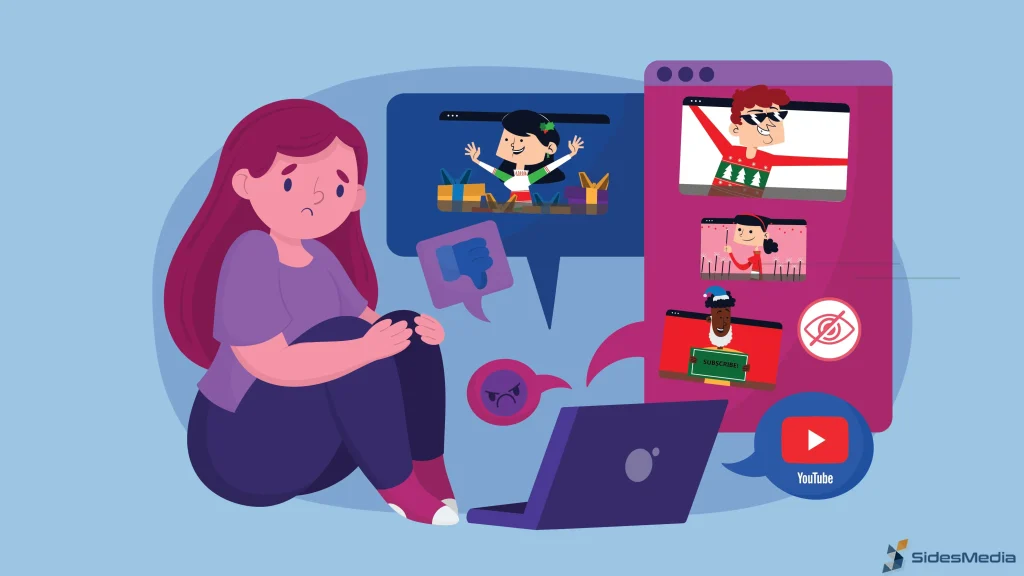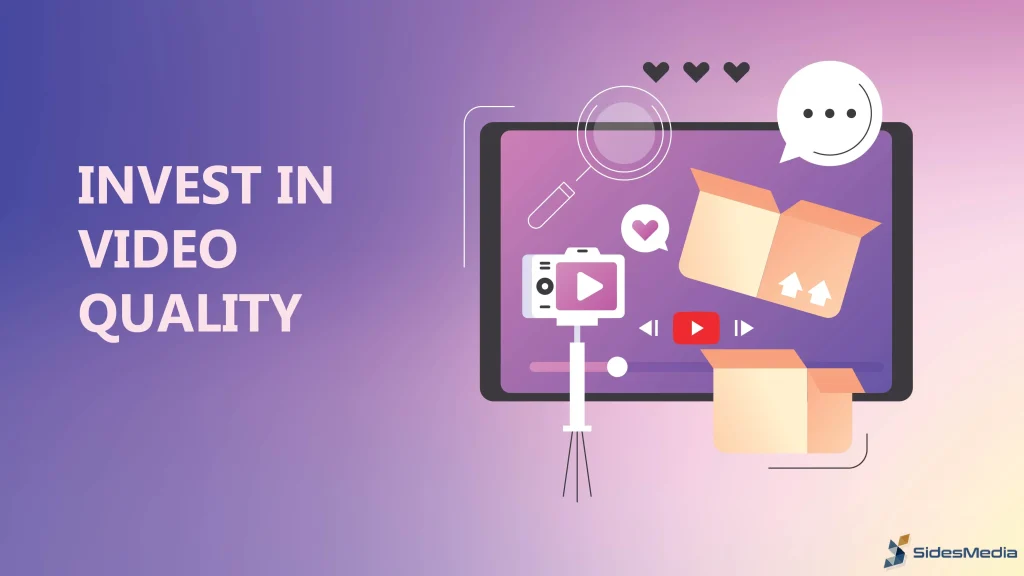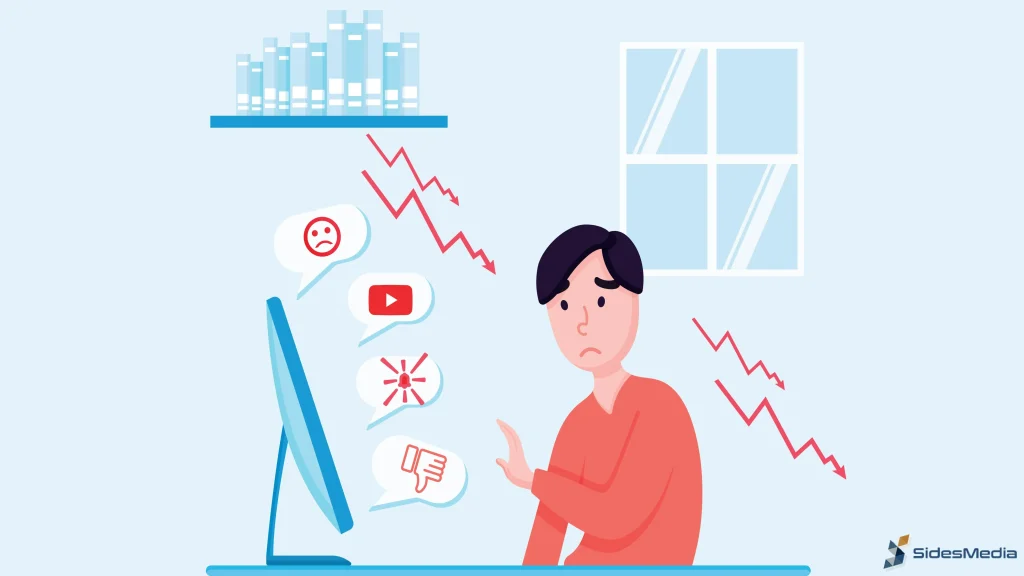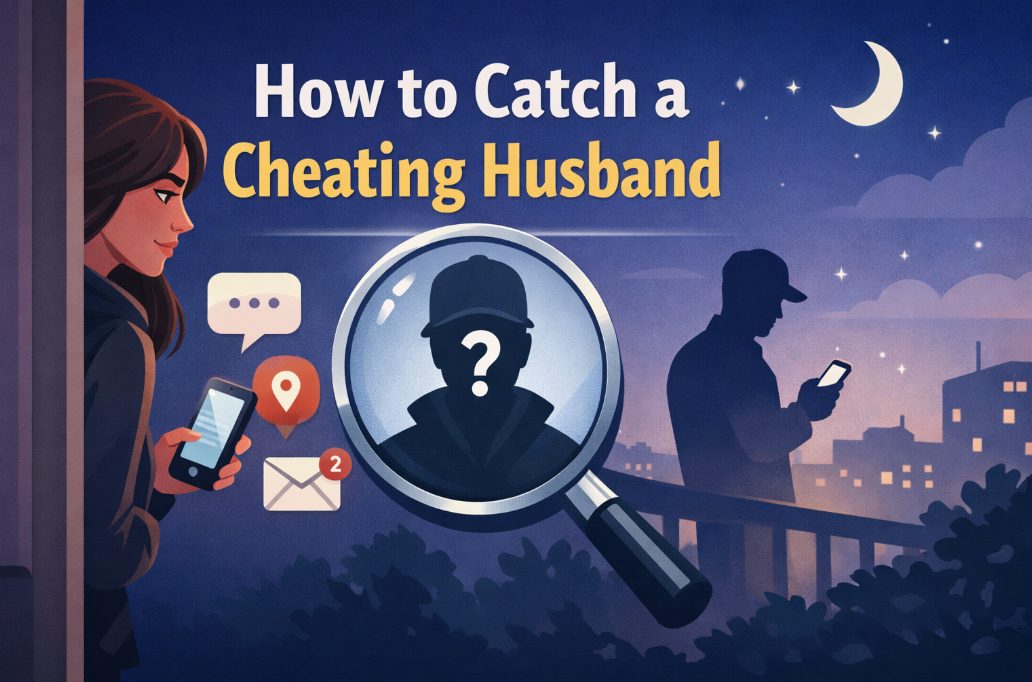Why Are My YouTube Videos Not Getting Views?
Published: August 9, 2024
Struggling to figure out why are my YouTube videos not getting views.
It can be discouraging to spend hours creating content only to see little engagement.
There are many reasons why your videos might not be reaching a broader audience, from the content itself to how it’s being promoted.
In this article, we’ll explore why your YouTube videos might not be getting views and provide actionable steps to improve your visibility.
We’ll also introduce how SidesMedia can help you increase engagement by allowing you to buy Youtube live views, giving your content the boost it needs.
Why Are My YouTube Videos Not Getting Views?

It’s tough when your hard work doesn’t get the recognition it deserves. If you’re seeing fewer views than expected, there might be some common reasons behind it.
One of the ways to get instant views on Youtube is by leveraging trending topics or collaborating with other creators. These strategies can give your videos the exposure they need to attract more viewers quickly.
Let’s explore these and what you can do to improve your video performance.
1. Inconsistent Posting Schedule
One of the main reasons your YouTube videos may not be getting views is inconsistency. If you’re not posting regularly, your audience might lose interest or forget about your YouTube channel altogether.
To remedy this, follow the steps to get 1k views on Youtube which include setting a consistent posting schedule, optimizing your video titles and thumbnails, and engaging with your audience.
For example, popular YouTubers often stick to a strict upload schedule to keep their audience engaged.
To boost your views, try consistently posting valuable videos at the same time each week to create anticipation among your subscribers.
best time to post on Youtube shorts depends on your audience’s activity, so analyze your analytics to find the optimal timing.
2. Poor Video Titles and Thumbnails
Your video title and video thumbnail are the first things YouTube viewers see, and they play a crucial role in attracting clicks.
If your titles are not compelling or your video thumbnail is unappealing, potential viewers might skip over your brand and video content.
Make sure your titles are clear, include relevant keywords, and promise something valuable to the viewer. Similarly, create a video thumbnail that is visually appealing and reflective of the content.
These elements help drive organic traffic and complement any strategies like when you buy free Youtube views ensuring that you attract the right audience for your videos.
3. Lack of SEO Optimization
Without proper SEO (Search Engine Optimization), your other videos may not rank well in YouTube searches.
This means fewer people will discover your content organically.
When trying to grow your YouTube channel, it’s important to focus on ways to get a million views on Youtube.
While there are no shortcuts, a combination of high-quality content, consistent uploads, and effective promotion can help you reach this milestone.
Use relevant keywords in your title, description, and video tags to help YouTube understand what your video is about and to reach the right audience.
4. Low Audience Retention Rates
If viewers are clicking away from your videos within the first few seconds, this signals to YouTube that your content may not be engaging.
This can result in your videos being ranked lower in search results.
To keep viewers engaged, start your YouTube video with an attention-grabbing hook and maintain a steady pace throughout the content.
5. Insufficient Promotion
Relying solely on YouTube’s algorithm to promote your videos and blowing up on YouTube isn’t always enough.
Actively sharing your videos on social media platforms, forums, and blogs can significantly boost your views.
For example, creators who explore ways to blow up on Youtube by sharing their content across multiple channels often see higher engagement and growth.
6. Content Quality

No matter how well you optimize your videos, if the video quality is poor, viewers won’t stick around for your video channel.
Make sure your videos are well-edited, have clear audio, and provide value to your audience.
High-quality content is more likely to be shared and recommended by viewers, leading to increased views. Even when you buy Youtube shorts views your audience should still find your content valuable and engaging to ensure long-term success.
7. Not Targeting the Right Audience
If your videos on your YouTube channel aren’t reaching the right audience, they won’t get the views they deserve.
Understanding who your viewers are and what they’re looking for will help you ensure that you’re targeting your content to the right demographic.
Tailoring your content to meet their needs can lead to higher YouTube engagement. One of the essential steps to increase Youtube engagement is to create compelling content that resonates with your audience, encouraging more interactions like likes, comments, and shares..
8. Neglecting Engagement with Your Audience
Interacting with your audience is key to building a loyal community on YouTube. If you don’t respond to comments or engage with viewers, they may lose interest in your channel.
Encouraging viewers to like, comment, and share your videos can significantly increase engagement and reach.
However, buy Youtube comments is also a tactic some creators use to boost engagement quickly. By purchasing comments, you can give your videos a social proof boost, which can encourage organic interaction from real users.
It’s important to ensure the comments look genuine and relevant, as fake or spammy comments could negatively impact your reputation.
9. Overlooking Video Descriptions and Tags
Your video marketing description is another important factor in SEO. A well-written description with the right video tags can help YouTube better understand your content and show it to the right audience.
Use this space to summarize your video, include relevant keywords, and add any necessary links.
10. Ignoring Analytics
YouTube provides a wealth of data through its analytics platform.
If you don’t regularly review your analytics, you might miss important insights into how your videos are performing and why they’re not getting views.
Pay attention to metrics like watch time, click-through rate, and audience retention to refine your content strategy.
Even when you buy Youtube watch hours, ensure your content is engaging, as genuine interaction from your audience will improve these metrics over time. Combining this with a solid content strategy will help you achieve sustainable growth and success on YouTube.
11. Limited Engagement Strategies
Encouraging viewers to subscribe, like, and comment on your videos can significantly boost engagement.
If you’re not actively prompting your audience to take these actions, your videos might not perform as well.
Simple reminders within your videos can go a long way in increasing interaction.
12. Not Utilizing Paid Promotion
Sometimes, organic growth isn’t enough, especially when you’re just starting out. This is where we at SidesMedia can help.
By allowing you to buy Youtube views, we provide a quick and effective way to boost your video’s visibility, helping it reach a larger audience and encouraging more organic growth.
Frequently Asked Questions

Why Are My YouTube Videos Not Getting Many Views?
If your YouTube videos are not getting many views, the issue could be tied to several factors. Poor SEO, lack of promotion, or low engagement rates can all contribute to lower view counts. One effective way to boost visibility is by leveraging Youtube promotion services, which help increase exposure and attract a larger audience to your content.
At SidesMedia, we help content creators like you by offering services to buy views. This provides an initial boost that can lead to greater organic reach.
How Do I Increase the Views on My YouTube Video?
To increase views on your YouTube videos, focus on optimizing your video content for SEO, creating engaging thumbnails, and promoting your videos across multiple platforms.
Additionally, consider investing in services like those offered by SidesMedia, where you can buy Youtube views to kickstart your video’s success.
Why Don’t 98% of YouTube Videos Get Views?
A staggering 98% of YouTube videos don’t get views due to a combination of factors such as poor seo, lack of promotion, and low video quality content.
These videos often fail to engage viewers or attract clicks.
Addressing these issues and using services like SidesMedia to boost visibility can increase the chances of your videos standing out in a crowded market. With the right mix of strategies, including choosing to buy Youtube likes, you can set yourself up for better engagement and growth.
Why Suddenly No Views on YouTube?
If your YouTube videos suddenly stop getting views, it could be due to changes in the algorithm, a drop in target audience engagement, or shifts in viewer interest.
Monitoring your analytics can help identify the problem.
Additionally, promoting your videos through platforms like SidesMedia can help revive your video’s performance by increasing visibility and engagement.
Conclusion
If you’re wondering, “Why are my YouTube videos not getting views?” the reasons can be numerous, ranging from inconsistent posting to poor SEO practices.
However, understanding these issues is the first step toward improving your channel’s performance.
By addressing the 12 common reasons we’ve discussed and using tools like SidesMedia to buy Youtube subscribers, you can give your videos the boost they need to reach a wider audience.
Remember, success on YouTube requires consistent effort, quality content, and sometimes a little extra help to stand out in a crowded space.



